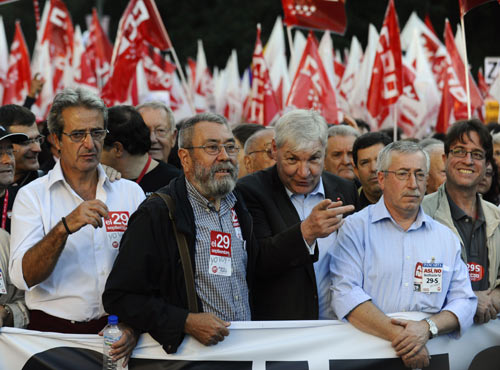Global General
Economic protestors rally across Europe
By Raf Casert (China Daily)
Updated: 2010-10-01 10:40
 |
Large Medium Small |
|
 |
BRUSSELS - Tens of thousands of workers have marched through the streets of Europe, decrying losses of jobs and benefits they fear will come with stinging austerity measures seeking to contain government debt.
Police fired shots in the air to disperse protesters at a general strike in Spain on Wednesday. Greek bus and trolley drivers walked off the job, joined by doctors who staged a 24-hour strike at state hospitals. Unions claimed a crowd of 100,000 marched on European Union headquarters in Brussels.
From Ireland to Greece, workers united around the theme that they are victims of a debt crisis caused by reckless high-spending bankers undermining Europe's cherished welfare state. They complained of higher taxes, job cuts, soaring unemployment and smaller pensions.
"We are protesting mainly for our children, because they're not here - they are out looking for jobs," said Emilio Martella, a 62-year-old retiree demonstrating with 2,000 others in Rome.
Italian public school teachers with temporary contracts didn't get them extended, and parents have complained that class sizes are getting bigger under the cuts.
Like Italy, many nations are raising, or considering raising pension age, fearing there won't be any money left to pay retirees in the future.
France's conservative government is moving through the legislature a controversial plan to increase the retirement age from 65 to 67, which officials say would save nearly $25.9 billion in 2018, and bring the pension system back into the black that year.
Countries including Greece and Spain have cut workers' pay, and across the continent governments have trimmed benefits that have long been generous by American standards.
Unemployment benefits were cut from four years to two in Denmark, Germany trimmed support for the long-term jobless and new parents who stay home, and Spain and England dropped bonuses to families.
The Brussels march came as the EU Commission proposed new penalties to punish member states that have run up deficits, mainly to fund social programs in a time of high unemployment.
The proposal, backed by Germany, was running into strong opposition from France, which wants elected politicians, not rigid accounting rules, to decide on what sanctions big-spending countries should face.
"It is a bizarre time for the European Commission to be proposing a regime of punishment," John Monks, general-secretary of the European Trade Union Confederation, told Associated Press Television News.
"How is that going to make the situation better? It is going to make it worse."
Moreover, he said, Europe already has 23 million jobless.
Unions fear workers will become the biggest victims of an economic crisis set off by bankers and traders, many of which were rescued by massive government intervention.
On Wednesday the general strike in Spain - its first since 2002 - marked a break in the once close relationship between unions and the Socialist-led government.
Spanish Prime Minister Jose Luis Rodriguez Zapatero's government is under severe pressure from unpopular measures to save Europe's fourth-largest economy from a bailout like one that rescued Greece from bankruptcy in May.
The cuts have helped Spain trim its central government deficit by half through July - but the unemployment rate still stands at a shocking 20 percent, and many businesses are struggling simply to survive.